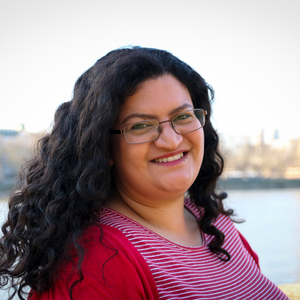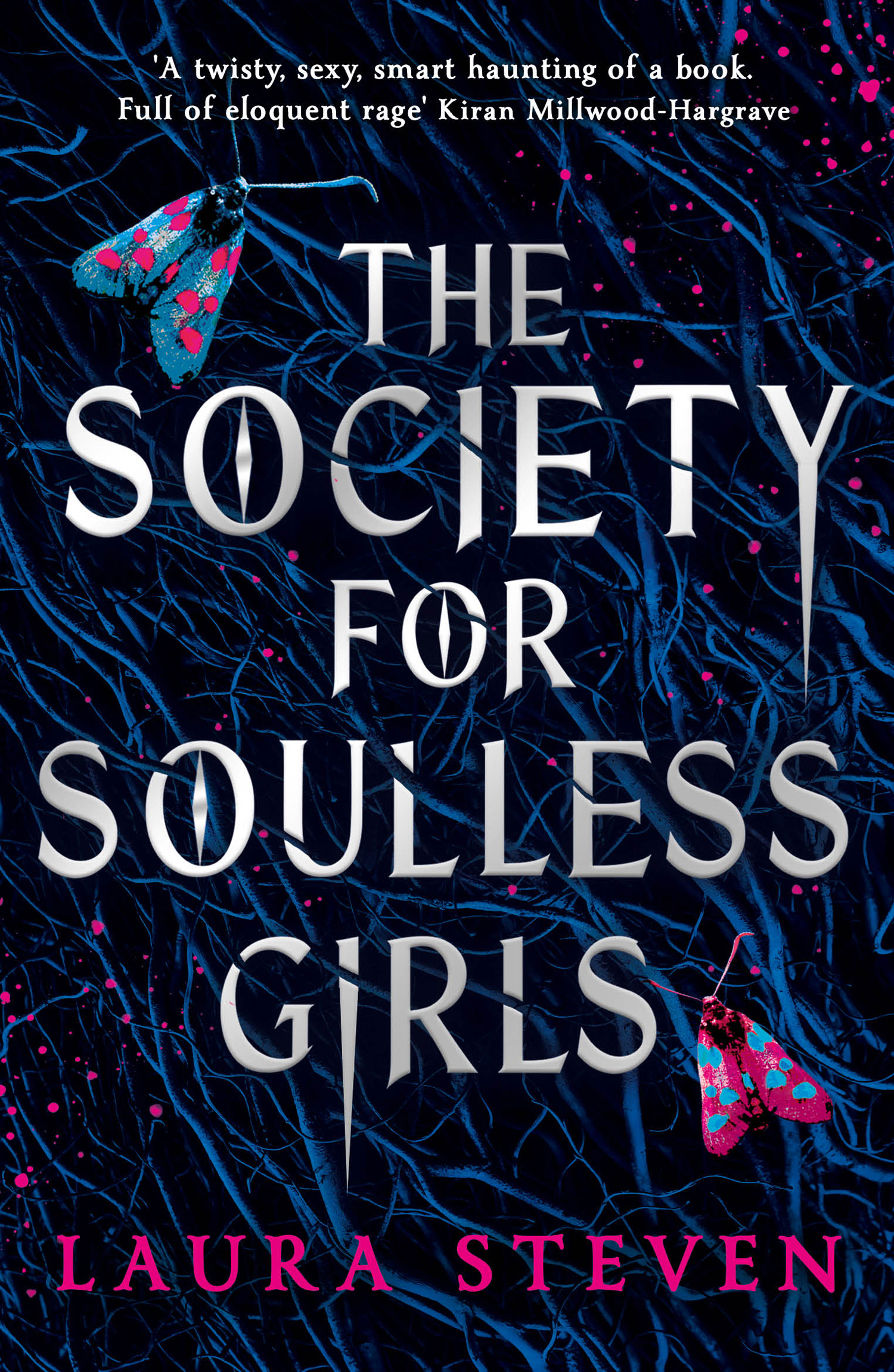You are viewing your 1 free article this month. Login to read more articles.
YA Book Prize shortlist: Laura Steven talks about The Society for Soulless Girls
 Caroline Carpenter
Caroline CarpenterCaroline is deputy features editor at The Bookseller and chair of the YA Book Prize, as well as being a co-host of children's book radio ...more
Laura Steven answers our questions about The Society for Soulless Girls (Electric Monkey), a dark academia novel exploring femininity and violence, which has been shortlisted for the YA Book Prize 2023.

Caroline is deputy features editor at The Bookseller and chair of the YA Book Prize, as well as being a co-host of children's book radio ...more
How would you describe your book to someone who hasn’t read it?
The Society for Soulless Girls is a sapphic reimagining of Jekyll & Hyde set at a haunted university. It follows wrathful Alice, who performs a demonic ritual to split her soul into good and evil, and her "sunshiney" roommate Lottie, who’s at Carvell College to investigate a string of decades-old murders. Their worlds collide when another body is found, and despite the dangerous situation and their fundamental mistrust of one another, they begin to fall in love. There’s also an immortal cat, because why not?
What inspired the story?
I really wanted to explore female anger in a meaningful and forgiving way. As girls and young women, we’re so often demonised for our rage. Throughout history, angry women have been burned at the stake as witches, demonically exorcised by priests (who often sold tickets to the event), prodded with electrodes in insane asylums . . . even now, a woman who dares to exhibit anger is labelled hysterical.
And yet anger is often the most powerful political tool we have. Without anger, there would have been no suffragettes. My favourite quote in the book sums this up: "Anger left to run free is like wildfire, indiscriminate in its destruction. But if you learn to tame it, to position it, to take aim with it? Then it becomes a candle. And what is the candle but one of humanity’s greatest assets? It warms, It nourishes. It shines a light in the darkest of places, and illuminates the path forward."
The Strange Case of Dr Jekyll and Mr Hyde felt like the perfect vehicle for this exploration because it is, at its heart, about the duality of (wo)man, about good versus evil. I was curious as to where anger as an emotion sat on that rather polarised scale, because it seems to me like it’s somewhere in the middle.
Which character in the book is your favourite, and why?
I always say that Lottie is who I am on the outside and Alice is how I feel on the inside, and so choosing between them feels impossible. They both carry a piece of me. So I’ll say Hafsah, because her dry wit and deadpan observations were extremely fun to write!
What does being on this year’s YA Book Prize shortlist mean to you?
I’m not sure I can quite put this into words. I wrote this book during a very dark time, both in my career and my life. I thought that if I wrote a character who felt as angry at the world as I did, nobody would like her, nobody would root for her. That they would feel repulsed by the depth of her rage (and, to be honest, violence). But I peeled away my outer layers until I found the ugliest core, and I let it all out. So to receive this kind of recognition for the parts of myself I believed were so unlovable . . . it’s very special.
It’s also so meaningful to me because I’ve been in this industry for nearly a decade. Having published eight – soon to be nine – books, I know that nothing is a given, that fancy awards are not the default experience, and that so much is out of our control. This means so much more to me because I’m not a shiny début anymore. I want to be in this game for the long haul, and initiatives like the YA Book Prize help so much with that kind of longevity.
What’s the best thing about writing for young adults?
Young adults are the most open-minded, passionate and discerning readers out there. I once wrote a 3,000-word article for a national newspaper on how YA can swing an election – that’s how much I believe in the power of young adult fiction.
Formative years are so critical for shaping worldview, for garnering empathy, for retaining a love of literature despite punishing school syllabuses. A teen recently commented on one of my TikTok videos about Soulless, saying "This book made me a reader." What more could I want than that?
It’s not all about politics and worthiness, though – it’s also just fun. YA readers are hard to impress. We’re competing against social media and Netflix and video games for their attention, and so we have to hook them immediately and never let go. It’s a hefty challenge as a writer, but I wouldn’t change it for the world.
What was your favourite book as a teenager?
I actually had a rough time with reading as a teenager. I read ferociously until I was around 12, borrowing the maximum number of books from the library every single week, staying up late at night with a torch under the covers, but then high school quickly made me associate reading with work. I went from reading solely for enjoyment to reading to prove my intelligence – and by extension my worth – and I hated it. I actually got a B in English Literature at A-Level, and so I became an author out of spite. I don’t even like books. Kidding.
All jokes aside, I think this is why I’m so passionate about keeping my YA fun and hooky, even if I’m exploring something deep and political. I didn’t come back to reading until my early twenties, and I often feel so sad at those "lost years". With every YA novel I write, I’m writing for that girl groaning her way through Dickens.
What’s your top writing tip?
I really believe that joy is a critical component in the writing process. Of course writing is work – a full-time job, for me – but if I’m not enjoying it on some level, what’s the point? If my inner child is not giddy at the thought of telling stories for a living, I have failed in some fundamental way.
So I keep a document filled with stuff that excites me to write about. This can be tropes (there’s a reason there are so many in Soulless!), cool setting quirks (roaring fires in common rooms, hidden passageways behind bookshelves, liminal underworlds), plot twists ([redacted]), emotions or philosophical ideas, beautiful words or phrases, whatever.
And if I’m ever feeling stuck on a scene, I’ll just open up my joy document and pick a few things out to get myself excited again.
What do you need around you when you’re writing?
I’m pretty "unfussy". For nearly a decade I’ve written on commutes, lunch breaks, in waiting rooms, on public transport, in airports, from my bed. I wrote a 100,000 word novel entirely on my Notes app while feeding a newborn baby (although I do recognise that sounds slightly deranged). Coffee is my only real non-negotiable!
What songs would be on a playlist for your book?
Alice Wolfe was literally named after Wolf Alice, so let’s go with them! And anything by Halsey, Lana Del Rey, Billie Eilish, Phoebe Bridgers or Paris Paloma.
Which book, film or TV show would you recommend to someone who enjoyed your book?
Books: go for some more twisty dark academia with a speculative bent like Ninth House, A Lesson in Vengeance, Babel: An Arcane History or An Education in Malice. For your sapphic needs, you simply must read Bitterthorn by Kat Dunn. I think about it daily.
Film and TV: I’m chronically behind on film and television, but "Wednesday"!











